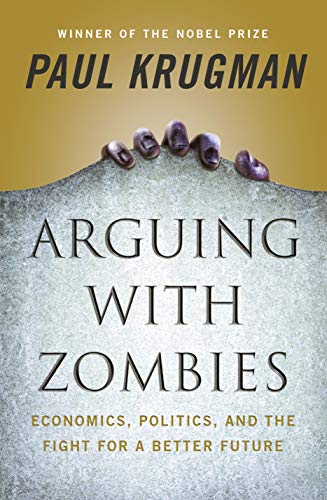InfiniteSummaries reviewed Arguing with Zombies by Paul Krugman
We finally have some BRAINS! in the debate
5 stars
[My review of the 12min summary]
Paul Krugman is the Nobel Prize-winning economist, college professor, and New York Times columnist. This book is a collection of some of his published columns.
Krugman says that some of the Republican political views are zombies. They're ideas that have no evidence behind them. No matter how many times you try to kill them, they just keep shambling toward you.
The book talks about the lies about Social Security that the Republicans knowingly made in an effort to convince the public that Social Security was failing, so they could privatize it.
He also talks about economic inequality. Rather than confront the actual causes, Republicans blamed: • Highly educated workers • The decline of family values • Technological advancement In all three cases, Krugman shows why these are not true.
He also addresses climate change and the excuses the Republicans made for not addressing it. …
[My review of the 12min summary]
Paul Krugman is the Nobel Prize-winning economist, college professor, and New York Times columnist. This book is a collection of some of his published columns.
Krugman says that some of the Republican political views are zombies. They're ideas that have no evidence behind them. No matter how many times you try to kill them, they just keep shambling toward you.
The book talks about the lies about Social Security that the Republicans knowingly made in an effort to convince the public that Social Security was failing, so they could privatize it.
He also talks about economic inequality. Rather than confront the actual causes, Republicans blamed: • Highly educated workers • The decline of family values • Technological advancement In all three cases, Krugman shows why these are not true.
He also addresses climate change and the excuses the Republicans made for not addressing it.
Lest you think that he blames all of our ills on Republicans, fear not! He also shows how the pro-Trump/anti-Hillary media bias gave us Donald Trump.
He also talks about the authoritarian, conspiracy-driven Trump administration.
Overall, this book is a small island of clarity in the murky swamp of misinformation that we swim through daily.
FINAL NOTES (quoted from 12min) "In 'Arguing with Zombies,' Krugman shows that the most effective weapons in the fight against zombie ideas are facts and common sense. David Cay Johnston, a Pulitzer Prize winner, praised Krugman's bestseller saying: 'Years after appearing in the daily newspaper, Paul Krugman's columns resonate because he avoids the herd mentality of most journalism. Applying history, math, and humanity, he transforms our understanding of great issues and when writing on economics translates the dismal science into plain English.'


